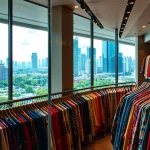Understanding Sustainable Practices in Women’s Fashion
Sustainable practices in the context of women’s fashion involve the mindful manufacturing, production, and consumption processes aimed at reducing the environmental impact and promoting ethical standards. These practices typically encompass elements such as the use of eco-friendly materials, responsible sourcing, reduced waste, and ethical labor conditions. By prioritizing sustainability, the fashion industry can significantly decrease its ecological footprint and contribute to global environmental goals.
The importance of sustainability in the fashion industry cannot be overstated. Fashion is one of the largest polluting industries worldwide, and its traditional processes often contribute to environmental degradation, water pollution, and excessive waste. By adopting sustainable methods, the industry can mitigate these negative impacts and pave the way for a more environmentally responsible future.
Current trends indicate a growing consumer demand for sustainable fashion options. Shoppers are increasingly prioritizing brands that demonstrate a commitment to sustainable practices and are transparent about their environmental impact. This shift has encouraged many designers and manufacturers to innovate and incorporate sustainability into their core business models, leading to an exciting transformation within the industry. For instance, the use of biodegradable textiles, recycled materials, and zero-waste patterns are becoming more prevalent as part of the industry’s sustainability efforts.
Overall, by embracing and understanding sustainable practices, stakeholders within women’s fashion can not only cater to emerging market trends but also partake in meaningful environmental and social change.
Impact of Sustainable Practices on UK Fashion Trends
The paradigm of sustainability is fundamentally altering UK fashion trends. Consumers today are increasingly motivated to align their purchasing decisions with their environmental values. They favour brands that showcase a strong commitment to sustainability, prompting an uptick in demand for eco-conscious products. This shift in consumer preferences is evident in the choices made across all price points, with customers ranging from budget-conscious shoppers to luxury buyers seeking accountable garments.
Sustainability’s impact is also visible in the creative processes within fashion houses. Designers now incorporate eco-friendly materials, such as organic cotton or plant-based dyes, into their collections. This not only reduces environmental harm but also sets new design precedents that redefine industry standards. For instance, the adoption of digital pattern making has minimized waste, proving that innovation and sustainability go hand in hand.
Several UK brands exemplify these sustainable practices by operationalizing production that respects both environmental and ethical standards. Such brands are often lauded for integrating sustainability into their ethos and inspiring others within the industry. As sustainability becomes increasingly ingrained in the fashion industry’s core, its potential to influence long-term UK fashion trends is both significant and promising.
Consumer Attitudes Towards Sustainable Fashion
Consumer attitudes towards sustainable fashion demonstrate a growing shift in purchase decisions. Many shoppers are motivated by environmental concerns and are keen to support brands that align with their values. This transformation reflects not just a trend, but a significant and lasting change in how consumers prioritize their spending.
Recent statistics illustrate this evolution. Studies indicate that over 60% of consumers in the UK consider sustainability pivotal when making fashion choices. Such figures underscore a heightened awareness and demand for transparency from fashion brands about their ethical and environmental practices. Additionally, consumer trends have shown that shoppers are willing to pay a premium for products that are eco-friendly, proving that the investment in sustainability pays off for both consumers and businesses.
Expert opinions consistently highlight the crucial role of sustainable fashion in shaping future consumer behaviour. Analysts predict an increase in conscious consumption, where quality and longevity of garments are valued over fast fashion. As awareness and education around sustainability advance, industry experts anticipate a more informed and engaged consumer base that demands responsible practices from all brands.
Notable UK Brands Leading in Sustainability
Exploring the landscape of sustainable fashion in the UK reveals an array of innovative brands setting the standard for eco-friendly practices. These brands are not only reshaping the fashion industry but also inspiring change through their committed efforts to integrate sustainability in every facet of their operations.
Brand 1: Overview and Initiatives
A prominent name in sustainable fashion, Brand 1 has pioneered numerous eco-friendly initiatives that have set industry benchmarks. Known for implementing closed-loop production, they focus on recycling and repurposing materials to extend the lifecycle of their products. This approach minimises waste and showcases how innovation can align efficiently with sustainability. Their transparent sourcing strategy further assures consumers of their commitment to ethical practices.
Brand 2: Overview and Initiatives
Brand 2’s commitment to sustainability is evident through their cutting-edge use of biodegradable materials. This initiative highlights their dedication to reducing environmental harm, setting an example for the entire industry. By prioritising environmental impact assessments for every new collection, Brand 2 ensures each product meets stringent ecological standards. This rigorous oversight demonstrates their pioneering role in promoting responsible fashion.
Brand 3: Overview and Initiatives
Long applauded for their zero-waste patterns, Brand 3 illustrates how intricate design can fuse seamlessly with environmental consciousness. Their approach includes utilising digital design tools to minimise fabric waste, playing an instrumental role in reducing the carbon footprint. Their investment in sustainable production processes has earned them accolades, reinforcing their status as a leader in ethical fashion.
In summary, these UK brands exemplify how sustainability can transcend traditional fashion boundaries, ushering in practices that are both innovative and ethically commendable. As they continue to influence the sustainability landscape, these brands pave the way for a greener future in women’s fashion.
Future Predictions for Sustainable Women’s Fashion in the UK
The landscape of UK sustainable fashion is poised for transformative shifts driven by advancing technology and innovation. As these elements become more intertwined with production and design, they promise to redefine the industry’s future. Technology’s role, particularly digital tools and innovative materials, will likely spearhead this evolution, enabling eco-friendly manufacturing and enhancing transparency in supply chains.
Forecasts suggest an expansion of sustainable practices across the entire fashion spectrum, from luxury to high street labels. These advancements could involve a greater focus on circular fashion models, where prolonging the lifecycle of garments becomes pivotal. This shift indicates an increased emphasis on recycling, upcycling, and collaborative consumption strategies.
As consumer awareness heightens, brands may be compelled to innovate further, integrating sustainability into their core values and operations. The expectation is that consumer dynamics will spur brands to adopt transparent communication regarding their sustainable practices. This movement could also encourage greater collaboration between technology companies and fashion brands, exploring new ways to reduce the environmental footprint.
Overall, these emerging trends denote a future where sustainability is not just a feature but an integral aspect of fashion, closely aligned with consumer and market demands.








